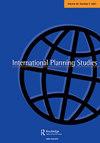A ‘planning revolution’ or an ‘attack on planning’ in England: digitization, digitalization, and democratization
IF 1.5
Q4 REGIONAL & URBAN PLANNING
引用次数: 12
Abstract
ABSTRACT This article focuses on the planning–technology nexus. Recent work explores the potential of digital technology in overcoming the longstanding limitations of a lack of public engagement and citizen empowerment in the planning process. In August 2020, the Government published a White Paper to democratize, digitize, and digitalize the planning system. We interrogate whether these radical reforms constitute a ‘planning revolution’ or an ‘attack on planning’; we focus on two important issues: democratic deficit and digital divide. The article examines how statements about digitization and digitalization may meet the Government’s desire to make the planning process more inclusive (i.e. equitable, fair, just) by empowering greater numbers of people to influence planning decisions for their local communities. In this agenda-setting article, we reflect on the English planning landscape; more broadly, we critically reflect on the values and political rhetoric involved in embracing technological innovations, and how these intersect with societal concerns.英国的“计划革命”或“对计划的攻击”:数字化、数字化和民主化
摘要本文关注规划与技术的关系。最近的工作探索了数字技术在克服规划过程中缺乏公众参与和公民赋权的长期局限性方面的潜力。2020年8月,政府发布了一份白皮书,对规划系统进行民主化、数字化和数字化。我们质疑这些激进的改革是构成“计划革命”还是“对计划的攻击”;我们关注两个重要问题:民主赤字和数字鸿沟。这篇文章探讨了关于数字化和数字化的声明如何满足政府的愿望,即通过授权更多的人影响当地社区的规划决策,使规划过程更具包容性(即公平、公平、公正)。在这篇设置议程的文章中,我们反思了英国的规划景观;更广泛地说,我们批判性地反思了拥抱技术创新所涉及的价值观和政治言论,以及这些与社会关切的交叉点。
本文章由计算机程序翻译,如有差异,请以英文原文为准。
求助全文
约1分钟内获得全文
求助全文
来源期刊

International Planning Studies
REGIONAL & URBAN PLANNING-
CiteScore
4.60
自引率
4.80%
发文量
20
期刊介绍:
Planning, at urban, regional, national and international levels, faces new challenges, notably those related to the growth of globalisation as both an objective socio-economic process and a shift in policy-maker perceptions and modes of analysis. International Planning Studies (IPS) addresses these issues by publishing quality research in a variety of specific fields and from a range of theoretical and normative perspectives, which helps improve understanding of the actual and potential role of planning and planners in this context.
 求助内容:
求助内容: 应助结果提醒方式:
应助结果提醒方式:


